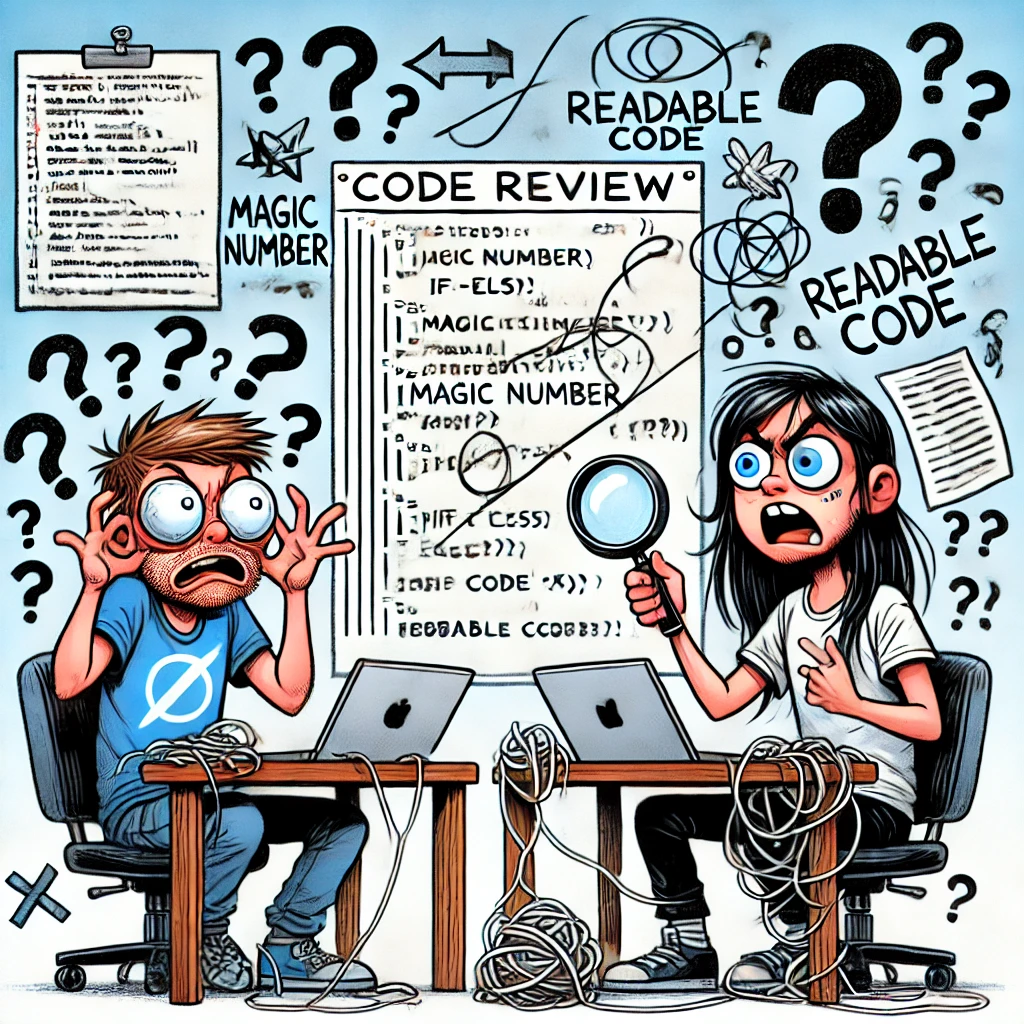
接下來簡單的說說上面的一些我覺得比較可以說的 :
這一點有點主觀,所以都會是用建議來看看對方想不想用 extract method 來改改。
ifelse 我覺得不是罪惡,重點是在這兩個 :
第一個應該在 SRP 那說過很多次了,就先跳過。
然後第二個,應該不少人都有看果,然後通常會有兩種類型,並且有不同優化法。
首先第一種就是沒辦法提前返回的,通常這種類型就是用設計模式來解決,以下面的範例來看就是使用策略 模式。
// Bad
function getDiscount(price: number, customerType: string): number {
if (customerType === "VIP") {
if (price > 500) {
return price * 0.8;
} else if (price > 100) {
return price * 0.85;
} else {
return price * 0.9;
}
} else if (customerType === "Regular") {
if (price > 500) {
return price * 0.9;
} else if (price > 100) {
return price * 0.95;
} else {
return price * 0.97;
}
} else {
return price;
}
}
// Good
interface DiscountStrategy {
applyDiscount(price: number): number;
}
class VIPDiscount implements DiscountStrategy {
applyDiscount(price: number): number {
if (price > 500) return price * 0.8;
if (price > 100) return price * 0.85;
return price * 0.9;
}
}
class RegularDiscount implements DiscountStrategy {
applyDiscount(price: number): number {
if (price > 500) return price * 0.9;
if (price > 100) return price * 0.95;
return price * 0.97;
}
}
class DiscountContext {
private strategy: DiscountStrategy;
constructor(strategy: DiscountStrategy) {
this.strategy = strategy;
}
getDiscount(price: number): number {
return this.strategy.applyDiscount(price);
}
}
const customerStrategyMap: Record<string, DiscountStrategy> = {
VIP: new VIPDiscount(),
Regular: new RegularDiscount(),
New: new NewDiscount(),
};
function getDiscount(price: number, customerType: string): number {
const discountStrategy = customerStrategyMap[customerType];
const discountContext = new DiscountContext(discountStrategy);
return discountContext.getDiscount(price);
}
還後還有一種就是可提前返回的,然後通常寫成比較好理解就是提前讓他返回
// Bad
function checkUser(user: { active: boolean, role: string }) {
if (user) {
if (user.active) {
if (user.role === "admin") {
return "Access granted";
} else {
return "Access denied";
}
} else {
return "User not active";
}
} else {
return "No user found";
}
}
// Good
function checkUser(user: { active: boolean, role: string }) {
if (!user) return "No user found";
if (!user.active) return "User not active";
if (user.role === "admin") return "Access granted";
return "Access denied";
}
這個有幾種情況,然後我自已都覺得會讓我都需要動腦或是找 code 看一下代表的意思 :
首先第 1 種情境,程式碼內的如下,會讓我花時間想一下 3600000 所代表的時間。
// Bad
function setSessionTimeout() {
const timeout = 3600000; // 魔術值
setTimeout(() => {
console.log("Session expired");
}, timeout);
}
// Good
const ONE_HOUR_IN_MS = 60 * 60 * 1000;
function setSessionTimeout() {
setTimeout(() => {
console.log("Session expired");
}, ONE_HOUR_IN_MS);
}
再來第 2 種情境為回傳值送我魔術值,外面使用時我都在通靈你是回傳什麼。
// Bad
function processPayment(amount: number): number {
if (amount < 0) {
return -2; // 魔術值
}
if (amount === 0) {
return -1; // 魔術值
}
// 處理付款
return 0;
}
// Good
enum PaymentStatus {
ERROR_NEGATIVE_AMOUNT,
ERROR_ZERO_AMOUNT,
PAYMENT_SUCCESS,
}
function processPayment(amount: number): PaymentStatus {
if (amount < 0) {
return PaymentStatus.ERROR_NEGATIVE_AMOUNT;
}
if (amount === 0) {
return PaymentStatus.ERROR_ZERO_AMOUNT;
}
// 處理付款
return PaymentStatus.PAYMENT_SUCCESS;
}
最後就是測試時的詭異數字。如下我真的不知道那個 2 是衝啥小,所以我通常會寫的向下面一樣,雖然會耗些資源,但只要 course 不要太大那就還好。
// Bad
describe("CourseService", () => {
it("should return the correct number of courses", async () => {
const courses = await CourseService.queryCourses();
expect(courses.length).to.equal(2); // 魔術數字 2
});
});
// Good
describe("CourseService", () => {
it("should return the correct number of courses", async () => {
const courses = await CourseService.queryCourses();
expect(courses.length).to.equal([courseA, courseC]); // 魔術數字 2
});
});
沒有必要的情況下,儘量不要 input 什麼然後就改變它,這個真的很難追 code,除非你們團隊有統一規定,某些特殊命名的方法有這種功用,例如populateXXX之類的,不然後真的不要用,除了難理解,很多時後會讓後面發生錯誤。
然後來說說第 2 點。
我知道有不少工程師會對 AI 產的 code 一直噴,但我自已的想法是,只要你有分辦好與壞的能力,那叫 AI 幫我們做事,可以幫我到我們,我自已會覺得沒啥問題 ~ 我覺得比較大的問題是用的人的問題,看過比較不好的幾個情況是會請 AI 生成 PR Description 然後就直接給人了,但是結果 AI 是將每一行 code 都在說明做了啥,但是 code reviewer 的人完全不需要。
還有就是用 AI 生成 code,然後問他為什麼會這樣寫呢,有什麼優點呢 ? 他就說 AI 這樣寫,這種人真的有點感覺是被 AI 用奴役住了 ~ 不是很好 ~ ( 年輕時會說真想打他,但年紀大了就覺得你自已的選擇 ~ 後果自已承擔 )
只是我發現除非可以自動化檢查,不然還是很難持住,當你進到公司時本來就是 2 ~ 3 種風格時,這就又更難了,因為有時後連我也記不住我們是什麼格式,有時後就參數一下旁邊的檔案,結果剛好就是錯的。
這個是最近我覺得很重要的東西,因為如果只是寫在程式碼中,而沒有開票放在 backlog 中,最後幾乎整份 code 有超多 todo,然後完全不知道還要不要 todo,因為寫的人都走了。
這篇文章中我大概整理了一下我 code review 時會看的比較篇理解性的幾個點。
整體來說以我個人的經驗來看,和 10 個工程師問太它們寫的 code 好理解嗎 ? 10 個有 10 個會說自已的 code 很好理解,客觀來說不能說錯,但有幾個前提假設 :
根據以上幾點,事實上我覺得不算錯,因為假設上述三個條件下都符合的情況下,我也會覺得他寫的 code 很好理解,就像我上面寫的 magiac number 為 2 這個情境,如果是寫的當下他,當然很清楚知道 2 是正確的,但可惜我不是寫的時後當下你的 ~
這裡我是覺得團隊真的要訂 rule 來維持理解度,不然真的就是一中各表,每個人都覺得自已的好維護,然後每個人接手後,又覺得其它人的很難維護,我覺得問題源都是上面那三個 ~ 然後我覺得覺得還是在於對好理解要用 rule 來維持 ~ 不過這只是我的想法 ~ 也不一定是對。
